- Home
- Alison Weir
The Lady Elizabeth Page 2
The Lady Elizabeth Read online
Page 2
Her mother, also wearing yellow, had been there on that night—she remembered this too. Her beautiful, slender mother, with the raven hair, the vibrant, inviting eyes, and the witty smile. But she had been talking to other people as the King paraded Elizabeth around the room, bidding his courtiers to admire her. It was strange, but Elizabeth had very few memories of her mother and father being together. Usually, they had come separately to see her at Hatfield, and she had understood that her father was so often occupied with ruling the kingdom that he could only rarely get away. Her mother, Queen Anne, visited more often, bringing her beloved dogs, and gifts for Elizabeth too, most of them beautifully made clothes—an orange satin gown, a russet velvet kirtle, a pair of crimson taffeta sleeves, a pearl-embroidered cap, or some tooled leather leading reins. Her mother did not play with her as boisterously as her father, but would sit with her in the walled garden, looking at the colorful pictures in the Queen’s exquisite Book of Hours, or strumming a lute—even at this young age, Elizabeth was already showing aptitude as a musician, a skill she had inherited from both her parents. Anne was more patient with her than Henry, and never seemed to grow bored in her daughter’s company. To Elizabeth, her mother was the ideal queen, beautiful, poised, and kind, and her love for her was tinged with reverence and awe.
Lying in her bed, with the firelight flickering on the wall, it had occurred to Elizabeth that it was a long time since her mother had been to Hatfield. The last time she had seen her was when the court was at Greenwich, a few weeks back; but that occasion had left Elizabeth disturbed and fearful. For the first time in her short life, she had sensed unhappiness and danger, for her mother and father had been angry with each other, very angry, and then her mother had grown tearful and distracted, which frightened the child. She could not understand why they were at odds, nor why, later, her mother had picked her up urgently and hastened to seek out the King once more. He had been standing by an open window, looking down on the courtyard below, when she approached him, and his anger was a tangible thing that left his daughter shrinking in her mother’s arms. Harsh words were exchanged, words that Elizabeth did not want to remember. She hated hearing her father calling her mother a witch, among other unkind names. Witches did bad things, things she could never associate with her mother. And what, she wondered, was a whore? And why should her mother have been so upset just because she had found the King with a wench called Seymour on his knee? There was nothing wrong with that, was there? Elizabeth herself had sat on his knee many times.
She could not recall how it had ended. The last thing she remembered of the encounter was her mother lifting her up, willing her father to take her in his arms.
“She is your true daughter!” Anne had wept. “You have named her your heir, and Parliament has approved it. She is yours—you have only to look at her.” Her father was frowning darkly, his face flushed with anger. He would not take her. Elizabeth had wriggled around and buried her face in her mother’s silken shoulder, full of fear. Then the Queen was almost running with her, hastening through one lavishly decorated apartment after another, until she reached a small wood-paneled closet hung with bright blue cloth. A young man was there, a priest by his garments, and when Elizabeth’s mother set her on the floor and sank to her knees on the prayer desk before the little altar, he laid a comforting hand on her shoulder.
“Tell me, Daughter,” he said.
“I may not have much time,” her mother whispered, mysteriously—and alarmingly. “Dr. Parker, I want you to promise me something. Swear you will do so.”
“I will do whatever is in my power, madam,” he answered. There was great kindness in his blunt features. Then Queen Anne rose and began breathlessly murmuring in his ear, her words indistinct, so that Elizabeth could not hear them. Dr. Parker’s face grew grave.
“If aught happens to me,” the Queen concluded, more audibly, “I must charge you with the welfare of my poor child here. Promise me you will look after her interests.”
The kind man had not hesitated to promise, and Elizabeth began to hope that he would speak to her father the King and tell him not to be nasty to her mother anymore. She had been horrified to witness the father she idolized behaving in such a harsh manner toward her mother, and appalled to see Anne’s distress. It was all far beyond her infant comprehension, and all she wanted was to retreat into the safe little world she had hitherto inhabited, with her parents in harmony with each other, and she happy and secure in their love.
Soon after that, Elizabeth had been sent back to Hatfield, a new doll in her arms—a parting gift from her mother. When she went, clutching Lady Bryan’s hand, to bid her father farewell, he had been his usual genial self, patting her on the head and smacking a kiss on her cheek. Once more she was his Bessy, which left her feeling greatly reassured, and by and by, as the daily routine of the nursery asserted itself, she began to forget the nastiness at Greenwich, and to believe that all was now well in her small world.
Until Sir John Shelton had called her my Lady Elizabeth.
Looking down on her little half sister, who was far too young to understand fully what she was about to say, Mary was filled with all the old conflicting feelings. She loved the child dearly, knowing that she was an innocent whom it would be unfair to hold responsible for the wrongs that her mother had done Mary and her own mother, Queen Katherine. Yet she could never forget that Elizabeth was Anne Boleyn’s child, and Mary had hated Anne Boleyn more than any other mortal on earth.
She should forgive, she told herself; her faith demanded it. But it was hard, nay, impossible, for the hurts had cut too deeply. Were it not for Anne Boleyn, her father would not have wickedly broken with the Pope in Rome, her mother would not have died abandoned and alone, and she herself would never have been declared a bastard—she, who had been the King’s true heir and successor to the throne—nor made to act as maid-servant to the baby Elizabeth. But her father—and here again, there was that conflict of emotions, and loyalties, for she loved him too, for all her fear of him—had fallen in love, bewitched by the black eyes and cunning charms of that whore, Anne Boleyn; and after that, twenty years of chaste and loving wedlock to Queen Katherine had counted for nothing, and Mary’s world had crashed in ruins about her.
Her sainted mother had borne rejection, harassment, exile, and mortal illness with great patience and fortitude, insisting all along that she was the King’s true wife, and believing through the weary, bitter years that he would one day come to his senses—even after he had set her aside and married Anne, even in the face of Anne’s threats to have Katherine and Mary executed for their refusal to acknowledge that marriage, which, Mary knew, was no true marriage.
On her knees, Mary had prayed that she might be granted that same patience, that fortitude. But she had been young, bitterly miserable, and deeply resentful, and she missed her mother desperately. How she had longed to be with her: Her yearning for the comfort that only Katherine could give had been constant, and not even five years of enforced separation could diminish it. And nor, she had found, could death, for Katherine had been dead these six months, poisoned, Mary was convinced, on the orders of that woman. She had been ailing for some time, and when they had cut her body open for the autopsy, they had found her heart to be black and putrid. What else could that betoken but poison? And then her father and the whore, wearing yellow for the mourning, they said, parading Elizabeth around the court, gloating in their triumph.
Anne had not gloated for long. On the very day of Katherine’s funeral, she had miscarried of the son the King so desperately wanted, had failed him in the same way that Katherine had failed him. He had been King of England for twenty-seven years, and still had no son to succeed him. Just two daughters, both now declared bastards.
Which brought Mary back to the matter at hand, the dread task from which she shrank. Elizabeth’s pointed little face was looking up at her, her black eyes inquiring. Apart from her coloring, she was entirely Anne Boleyn’s child—even her long-fin
gered hands were Anne’s. Anne, Mary remembered, had had a sixth finger—a devil’s mark, some people were saying, knowing that it was at last safe openly to revile her. But her detractors were not so many now, for astonishingly, in the wake of what had happened recently, there were an increasing number who expressed sympathy…
Yes, Elizabeth was her mother’s child, in her appearance and her quick wits, her mercurial temperament and her vanity: Already, she held herself with poise, delighting in fine gowns and peering into mirrors to admire herself. But was she King Harry’s? This thought had tortured Mary ever since she had heard the accusations against the lute player Mark Smeaton. Mary had never seen him herself, she had not been at court for many years, but some of her friends there were of the opinion that Elizabeth had a look of him, although of course they could not be certain, since they had never thought to pay him that much attention during the years before he had won notoriety. It worried Mary, though, because no one else, even the King, appeared to entertain the suspicion that Mark was Elizabeth’s father, and it would continue to vex her: Every time she saw Elizabeth, she was consciously or subconsciously scrutinizing the child, hoping to see in her some trace of the King.
Resolutely, she pushed the thought aside. Whoever her father was, and whatever Anne Boleyn had been, Elizabeth was a helpless little child who had to be told that her mother was dead. Mary resolved to be gentle with her, and her innate kindness asserted itself.
Elizabeth was swinging her legs restlessly, wondering when Mary was going to say something. Something in the way her sister was regarding her, at once mournful and questioning, made her feel uncomfortable. Then Mary laid a hand on hers.
“Elizabeth, sweeting, do you know what treason is?” Mary had been agonizing for days as to how she would broach this painful subject. She had even thought of beginning by saying that Anne had gone to live with God in Paradise, but Mary did not believe this herself—the witch was surely in Hell—and her inborn honesty demanded that she speak the truth.
“No,” said Elizabeth doubtfully, her innocent eyes wide and perplexed.
“It is when someone does something bad against the King. Hurts him in some way, or plots wickedness. Do you understand?”
Elizabeth nodded. Plotting wickedness featured largely in the stories Lady Bryan told her, like the naughty fox in Chanticleer. She was in familiar territory here.
“People who commit treason get punished. They are put to death,” Mary went on.
Death. Elizabeth now knew what that was. The chaplain had explained it to her. It meant your body going to sleep forever and ever, and your soul—although she still wasn’t quite sure what that was—going to Heaven to live with God and all the saints and angels—if you were good. If you had been bad, you went to a terrible place called Hell where devils were horrid to you all the time and hurt you with their sharp pitchforks. Elizabeth had once seen a painting of Hell in a church, and had had to hide her eyes because it was so frightening. Ever since then, she had tried to be good—but it was very difficult, for there were so many pitfalls into which a headstrong little girl such as herself might stumble.
“Do you understand, Elizabeth?” Mary was saying. “People who commit treason are put to death. Treason is the worst crime of all, worse than murder or stealing, because it is against the King’s Majesty, who is God’s Anointed on earth.”
Elizabeth nodded.
“Sweetheart, there is no easy way to say this”—Mary’s words were coming in a rush now—“but your mother committed treason against the King our father, and she has suffered the punishment. She has been put to death.”
Elizabeth looked as if she hadn’t heard. She was staring into the distance toward the palace that basked in the sunshine, her face a passive blank.
“Do you understand?” Mary asked again, squeezing the little hand beneath hers. Elizabeth drew it away. Suffered the punishment…put to death…suffered the punishment…put to death…Mary’s words were beating over and over in her head; she was trying to make sense of them. What did Mary mean? Put to death…put to death…
Lady Bryan was walking toward them.
“My lady, have you told her?” she inquired gently. Suddenly, Elizabeth slid off the bench and ran to her governess, burying her face in her skirts and bursting into violent tears.
“Mother! My mother! Mother! Where is she? I want her!” she wailed piteously, her small body trembling in fear. “I want her! Get her!”
Both Lady Bryan and the Lady Mary knelt down, doing their best to comfort the stricken child, but she would not be consoled.
“Where is my mother?” she wailed.
“She is dead, my lamb,” wept Lady Bryan. “She is with God.”
At this, Elizabeth began to scream. “I want her! I want her!”
“You must pray for her,” faltered Mary.
But Elizabeth was beyond speech, howling her heart out.
They were all very kind to her in the days that followed. Lady Bryan found her special tasks to do in the house, the cook served her favorite foods, her sister’s female fool made merry jests and capered before her at mealtimes, brandishing her jingling bells, but it was Mary whom she wanted, Mary who was kindest of all, who spent hours playing with her and rescued her from the tedium of the well-meaning Sir John’s dull stories.
“What shall it be tonight, my lady? Patient Grizelda or Theseus and the Minotaur?” he had asked.
“I had Theseus yesterday, again,” declared Elizabeth, sighing. “Read Patient Grizelda.”
“Listen carefully,” he said, opening the book. “This is a fitting tale for a little girl such as yourself, who might profit by its example of an obedient wife.”
“The Lady Mary reads stories much better than you do,” his audience pronounced, fidgeting, before he had completed the first page.
“Allow me,” smiled Mary, taking the book. Sir John withdrew gratefully, but not a little disgruntled at the criticism.
Later that evening, Mary joined him and Lady Bryan for a cup of wine before bedtime.
“Did the Lady Elizabeth enjoy her story?” he asked.
“No,” said Mary. “She was very definite on the subject of how she would have treated Grizelda’s husband.”
“Oh, dear,” frowned Sir John ruefully. He knew his charge well. “I hope it diverted her, at least.”
“I think so,” said Mary. “It took her mind off things for a time.”
There were no further storms of tears. With the resilience of childhood, Elizabeth allowed herself to be further diverted and, although subdued, responded to the comfort afforded her by others. Praised be God, Lady Bryan said to herself, the worst moment is surely over.
“I have something to tell you,” Mary said, fanning herself with her kerchief as they sat in the shade in the flower garden. It was still hot, and the scent of roses and honeysuckle hung heavy on the air.
Elizabeth looked at her suspiciously.
“Nothing bad. Good news in fact. We have a new stepmother.”
“I don’t want a stepmother,” said Elizabeth through pursed lips. “I want you!”
Mary smiled, touched by this, and patted the child’s cheek.
“Sister, you should rejoice. She is a kind lady. She has been so good to me, and she is ready to be a mother to you too.”
Elizabeth thought about this.
“What is her name?” she asked.
“Queen Jane,” Mary answered. “Jane Seymour that was.”
Seymour. Where had Elizabeth heard that name before?
“The Queen has made me most welcome at court, and she wants you to visit her there also,” Mary continued, then paused. Of the price of her return to court, and being received back into her father’s favor, she could not bear to think.
“Sign!” Master Secretary Cromwell had urged. “Submit to your father, as is your duty. Admit that your mother’s marriage was incestuous and unlawful, and that you were wrong to defy His Majesty. Then all will go well for you.”
&nbs
p; If she signed, as they were hounding her to do, nothing would ever be well again: She had known that for a certainty. How could she be cowardly and give in when her mother had held fast and stood firm on these very issues for so many years, and in the face of great adversity?
But Mary also knew that her submission would win back her father’s love, so she had written, begging for permission to come to him, had even offered to prostrate herself at his feet and ask his pardon for any offenses she had committed against him; but he had not answered. All he was interested in was her written submission to his demands: He must see with his own eyes her unequivocal acknowledgment of the rightness of his decision to set aside her mother.
She could not bring herself to give it. She was ill, with the megrims and monthly aches from which she had suffered these many years, and she could bear no more pain.
“Sign!” insisted the Emperor’s ambassador, Chapuys, sent by his master to champion the cause of the late Queen Katherine and her daughter. The Emperor was Katherine’s nephew and Mary’s cousin, and Chapuys assured Mary that he had her best interests at heart.
“Sign,” he said again. “His Holiness the Pope will absolve you from all moral responsibility, for an oath given under duress is void.”
So Mary had signed. Not only did she accede that her mother’s marriage had been incestuous and unlawful, and that she herself was therefore a bastard, but she also acknowledged her father the King to be the Supreme Head of the Church of England under Christ. In one stroke, she had admitted herself baseborn, repudiated the authority of the Pope, and abandoned all the principles and loyalties she and her mother had held most dear, and although the promised absolution was in due course forthcoming, she knew she would never, ever forgive herself.

 Richard III and the Princes in the Tower
Richard III and the Princes in the Tower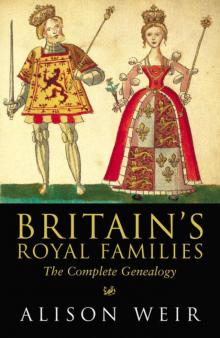 Britain's Royal Families: The Complete Genealogy
Britain's Royal Families: The Complete Genealogy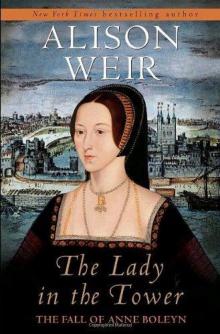 The Lady in the Tower: The Fall of Anne Boleyn
The Lady in the Tower: The Fall of Anne Boleyn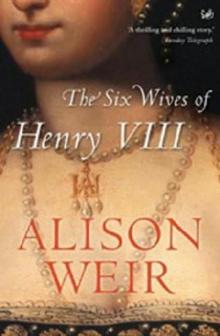 Six Wives of Henry VIII
Six Wives of Henry VIII Elizabeth of York: A Tudor Queen and Her World
Elizabeth of York: A Tudor Queen and Her World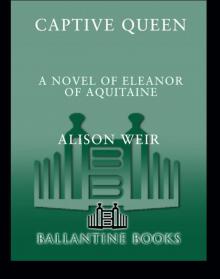 Captive Queen
Captive Queen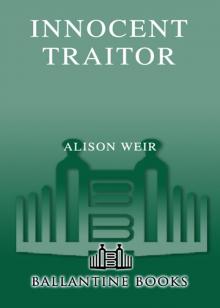 Innocent Traitor
Innocent Traitor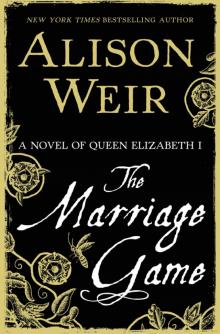 The Marriage Game
The Marriage Game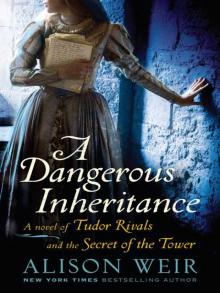 A Dangerous Inheritance
A Dangerous Inheritance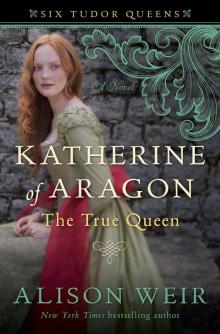 Katherine of Aragón: The True Queen
Katherine of Aragón: The True Queen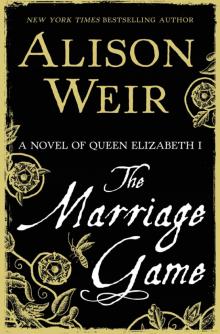 The Marriage Game: A Novel of Queen Elizabeth I
The Marriage Game: A Novel of Queen Elizabeth I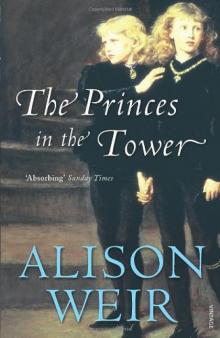 Princes in the Tower
Princes in the Tower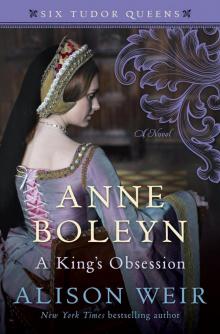 Anne Boleyn: A King's Obsession
Anne Boleyn: A King's Obsession Traitors of the Tower
Traitors of the Tower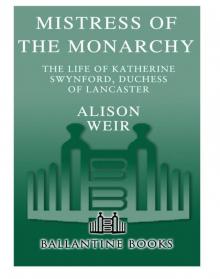 Mistress of the Monarchy: The Life of Katherine Swynford, Duchess of Lancaster
Mistress of the Monarchy: The Life of Katherine Swynford, Duchess of Lancaster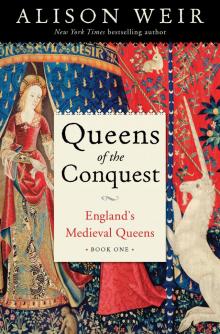 Queens of the Conquest: England’s Medieval Queens
Queens of the Conquest: England’s Medieval Queens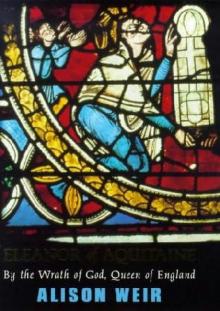 Eleanor of Aquitaine: A Life
Eleanor of Aquitaine: A Life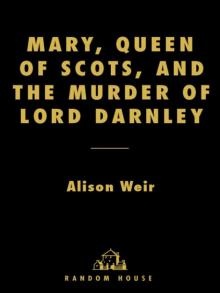 Mary, Queen of Scots, and the Murder of Lord Darnley
Mary, Queen of Scots, and the Murder of Lord Darnley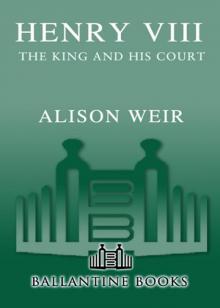 Henry VIII: The King and His Court
Henry VIII: The King and His Court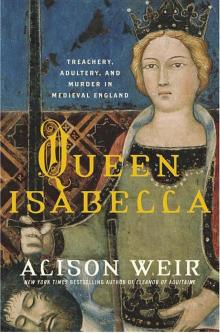 Queen Isabella: Treachery, Adultery, and Murder in Medieval England
Queen Isabella: Treachery, Adultery, and Murder in Medieval England Katheryn Howard, the Scandalous Queen
Katheryn Howard, the Scandalous Queen Arthur- Prince of the Roses
Arthur- Prince of the Roses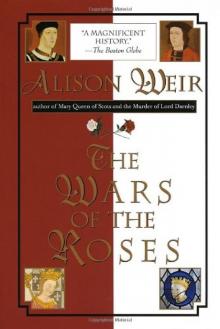 The Wars of the Roses
The Wars of the Roses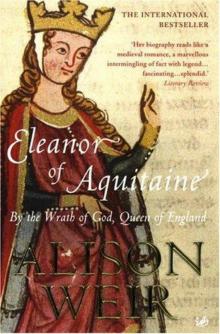 Eleanor of Aquitaine: By the Wrath of God, Queen of England
Eleanor of Aquitaine: By the Wrath of God, Queen of England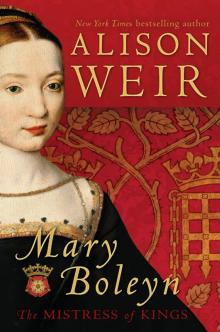 Mary Boleyn: The Great and Infamous Whore
Mary Boleyn: The Great and Infamous Whore Jane Seymour: The Haunted Queen
Jane Seymour: The Haunted Queen Anna of Kleve, the Princess in the Portrait
Anna of Kleve, the Princess in the Portrait Lancaster and York: The Wars of the Roses
Lancaster and York: The Wars of the Roses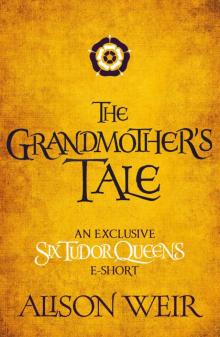 The Grandmother's Tale
The Grandmother's Tale The Princess of Scotland (Six Tudor Queens #5.5)
The Princess of Scotland (Six Tudor Queens #5.5)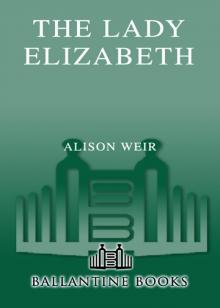 The Lady Elizabeth
The Lady Elizabeth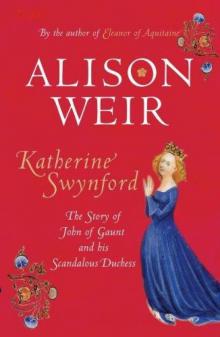 Katherine Swynford: The Story of John of Gaunt and His Scandalous Duchess
Katherine Swynford: The Story of John of Gaunt and His Scandalous Duchess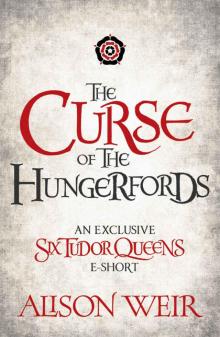 The Curse of the Hungerfords
The Curse of the Hungerfords The Lost Tudor Princess: The Life of Lady Margaret Douglas
The Lost Tudor Princess: The Life of Lady Margaret Douglas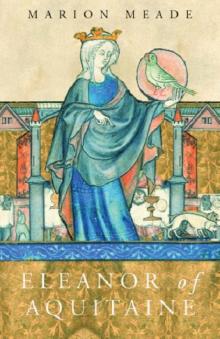 Eleanor of Aquitaine
Eleanor of Aquitaine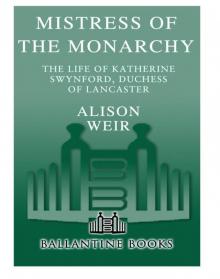 Mistress of the Monarchy
Mistress of the Monarchy The Lost Tudor Princess
The Lost Tudor Princess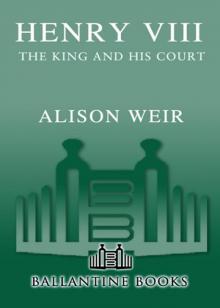 Henry VIII
Henry VIII Anne Boleyn, a King's Obsession
Anne Boleyn, a King's Obsession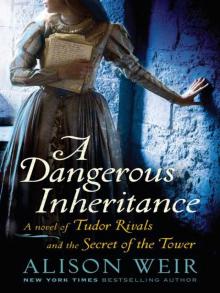 A Dangerous Inheritance: A Novel of Tudor Rivals and the Secret of the Tower
A Dangerous Inheritance: A Novel of Tudor Rivals and the Secret of the Tower Elizabeth of York
Elizabeth of York Katherine of Aragon, the True Queen
Katherine of Aragon, the True Queen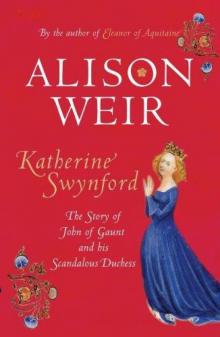 Katherine Swynford
Katherine Swynford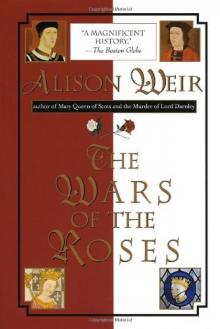 Wars of the Roses
Wars of the Roses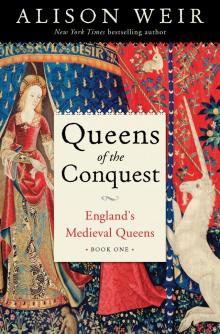 Queens of the Conquest
Queens of the Conquest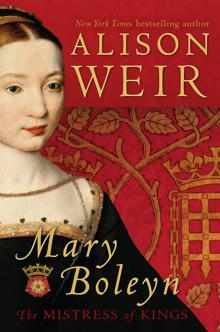 Mary Boleyn
Mary Boleyn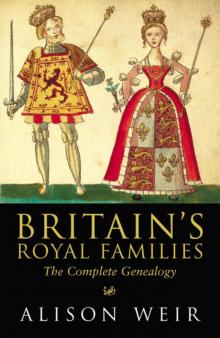 Britain's Royal Families
Britain's Royal Families The Tower Is Full of Ghosts Today
The Tower Is Full of Ghosts Today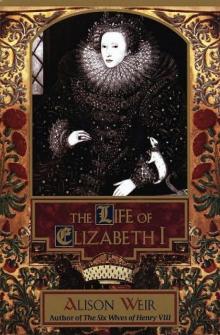 Life of Elizabeth I
Life of Elizabeth I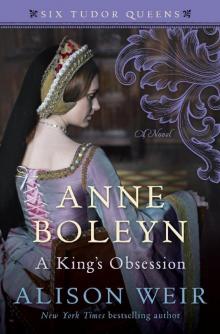 Anne Boleyn A King's Obssession
Anne Boleyn A King's Obssession Lancaster and York
Lancaster and York Jane Seymour, the Haunted Queen
Jane Seymour, the Haunted Queen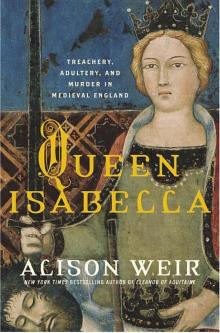 Queen Isabella
Queen Isabella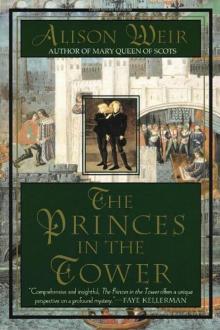 The princes in the tower
The princes in the tower